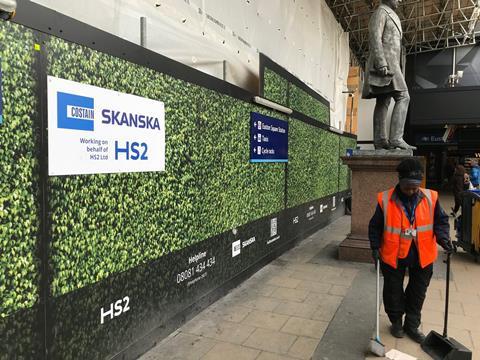Oakervee report says winning civils firms have inflated prices to cover risks
HS2 has been told to consider reprocuring its main civil engineering contractors for the first phase of the project if they do not agree to cut costs.
Firms lined up for work, officially valued at £6.6bn, include Balfour Beatty, Vinci, Costain, Skanska, Sir Robert McAlpine and Kier. They were all awarded the two-stage contracts back in July 2017.

But last month the National Audit Office said the cost of these jobs had soared to £10.7bn by October last year.
The 130-page Oakervee review, commissioned by the government last August, has now recommended that HS2 needs to tell contractors to get the price down before work starts in earnest.
It said: “The government should ensure that HS2 Ltd achieves a satisfactory position with each of the main works civils contractors in order to obtain acceptable stage two prices and a reasonable level of value engineering.
>> Analysis: How much construction stands to gain now HS2 has been approved
“If HS2 Ltd cannot achieve a satisfactory position with the main works civils contractors, then HS2 Ltd may have to consider reprocuring these contracts. A reprocurement of some or all of these contracts would introduce some delay to the programme but could potentially result in a reduction in costs.”
Building understands that HS2 has contractual arrangements in place that would allow it to hand a contract earmarked for one civils contractor to another in the event issues arise with one of its suppliers.
Phase 1 civils contractors
- SCS joint venture (Skanska, Costain and Strabag)
- Align joint venture (Bouygues, VolkerFitzpatrick, Sir Robert McAlpine)
- Eiffage and Kier joint venture (included Carillion before its collapse)
- BBV joint venture (Balfour Beatty, Vinci)
The report, released in the wake of Boris Johnson giving the scheme the green light yesterday, also said HS2 should shoulder the bulk of the risk in order to keep costs down. It said contractors had increased prices disproportionately to cover risks on the job.
It said: “Given the fragile state of the UK construction industry, especially following the collapse of Carillion and others, the contractors have behaved in a risk-adverse manner and hence priced the potential risks very highly.
“The review considers that it would be preferable for HS2 Ltd, and not the construction contractors, to carry and manage all risk save for those risks covered by the contractors’ normal insurances.”
Johnson promised: “We will, in line with Mr Oakervee’s recommendations, be interrogating the current costs to identify where savings can be made in phase 1."
The review recommended that Old Oak Common, due to be built by a Balfour Beatty team, be used as a temporary London terminus while work at the Euston HS2 station, being carried out by a Mace and Dragados team, is completed.
Balfour Beatty boss Leo Quinn said the decision showed "the UK can clearly demonstrate it has thrown open its doors for business and investment."
Approving the project Johnson said: “I will be creating new delivery arrangements for both the grossly behind schedule Euston terminus and phase 2b of the wider project.”
These are expected to see the Mace team brought together with the Lendlease team, the firm responsible for the development of the wider station site, into one group along with clients Network Rail and Transport for London.
Mace chief executive Mark Reynolds said the move meant the work would be “planned and delivered more effectively”.
In his report, Oakervee recommends setting up “one organisation to bring together all the stakeholders [...] and this should not be HS2 Ltd”.
The report also said that if current arrangements for over station development across the entire project were left in place, there was a risk the economic value from such schemes would not be maximised and that projects would be late and over-budget.
It said HS2 may not have the capacity to manage this part of the job and should consider bringing in private firms and local authorities to take on the role.
Oakervee review: Recommendations at a glance
- The government should consider merging construction of phase 2a with phase 1
- Systems integration in HS2 Ltd needs to be strengthened now and maintained throughout the project's life. There should also be a single point of accountability for systems integration. This is a vital lesson from Crossrail
- The existing design for the HS2 station at Euston is not satisfactory. The efficiency of the station as a whole should be assessed and potentially simplified
- A further study, to be completed by this summer, should examine an integrated railway plan for phase 2b alongside an integrated railway investment programme for the Midlands and north of England. It should look at how to bring forward rail improvements for the regions as quickly as possible - and before HS2’s plan to open in 2035-40
- HS2 contracts have been over-specified and "gold-plated". Design standards and specifications could be made less severe without major risk
- The scope and size of procurement packages should be reassessed. Smaller work packages may be more deliverable but would require robust management


























No comments yet